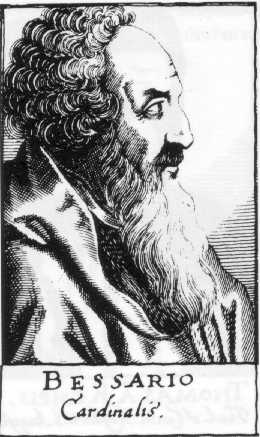If only he had shaved that morning.
Basilios Bessarion grew up in an Eastern Orthodox community in present-day Turkey in the early 15th century. He become a monk, then an abbot, and was eventually appointed to be a metropolitan bishop by the Byzantine Emperor John VIII Palaeologus, with whom he attended the ecumenical Council of Florence with hopes to reunite eastern and western Christianity. Though Bessarion was originally against reunion with Rome, he quickly changed his mind and became the most important Eastern Orthodox advocate for reunion at the council. Pope Eugene IV was so impressed by him that he made Bessarion a cardinal. From that point on, Bessarion lived and worked in Italy.
Flash forward to 1455: the cardinals, including Bessarion, are in the midst of another papal conclave to elect a new pope. There are two factions, each aligned with a different Italian politician. After a number of votes with no consensus, the cardinals start looking for a more politically neutral candidate. Bessarion was an obvious choice since he was from the east and was less invested in Italian politics. And in fact he received a number of votes in the next round.
But there was one problem: he had a beard and refused to shave it.

It had long been a tradition in Eastern Christianity for priests to have beards. In the 11th century following the Great East-West Schism, Rome made it against canon law for priests in the west to have beards, although there was continued debate about it for many centuries.
Although Bessarion had accepted the ecclesiological role of Rome, he wanted to keep for himself various Orthodox customs that weren’t contrary to the faith. And apparently he had been allowed to do so up until that time.
But now that he was being considered for the papacy, cardinals who were displeased with his eastern Christian practices started voicing their disapproval. One french cardinal reportedly pleaded with the whole group of cardinals:
Shall we select for Pope, for head of the Latin Church, a Greek, a mere interloper? Bessarion still wears his beard—and forsooth, he is to be our Lord! How poor, then, must be our Latin Church, if we can find no worthy man in it, but must needs resort to a Greek, and to one, too, who but yesterday attacked the Roman faith! And because he has now returned shall he be our master and the leader of the Christian army? Behold, such is the poverty of the Latin Church that she cannot find an apostolic sovereign without resorting to a Greek! Oh, Fathers! Do what you think fit; but for myself and those who think with me, we will never consent to a Greek head of the Church!”
In other words, the fact that he still had a beard was taken to symbolize that he wasn’t Roman enough to be pope.
Bessarion made no attempt to defend himself, saying that he wasn’t interested in being pope anyway. The cardinals ended up electing Pope Callixtus III, the Church’s first Spanish pope.
Though he lost the 1455 conclave, Bessarion remained well-respected among many of the cardinals and was also a strong papal candidate in the 1464 papal conclave.
But he never did shave that beard.

